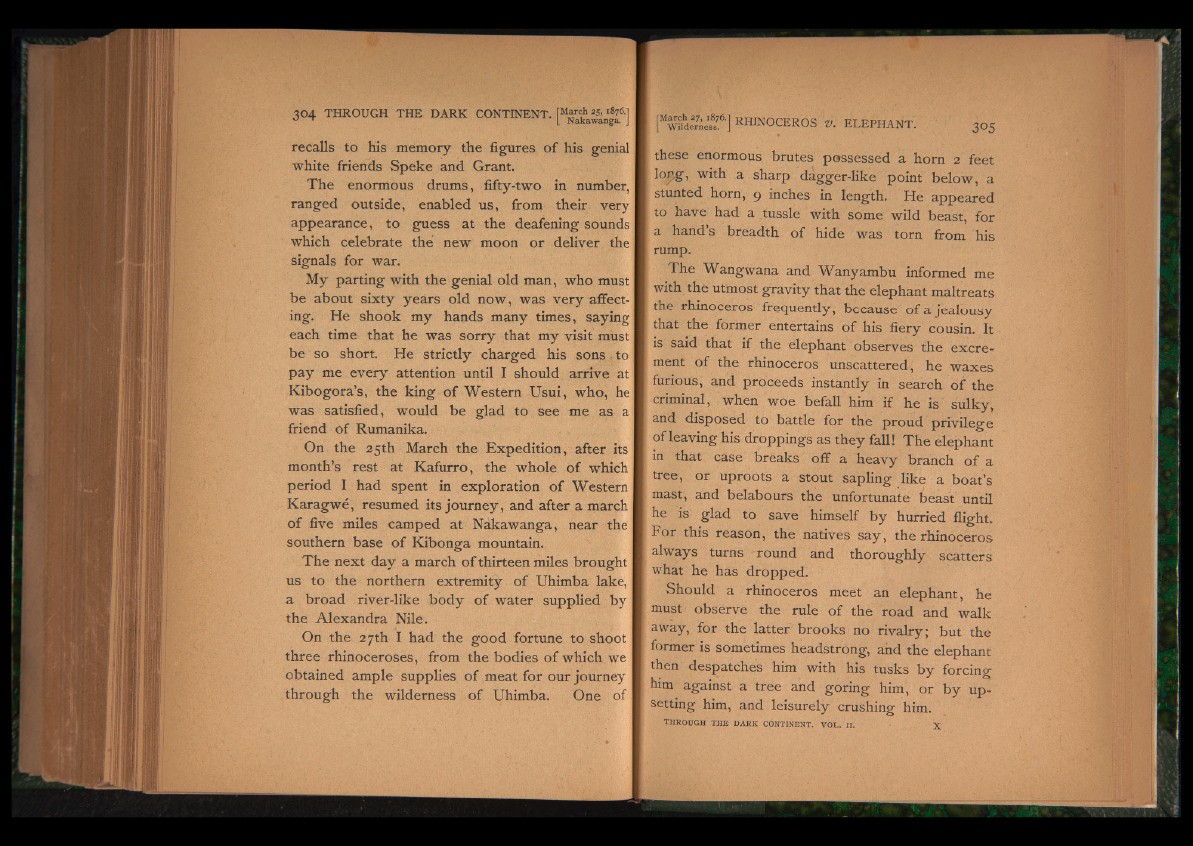
recalls to his memory the figures o f his genial
white friends Speke and Grant.
The enormous drums, fifty-two in number,
ranged outside, enabled us, from their yery
appearance, to guess at the deafening sounds
which celebrate the new moon or deliver the
signals for war.
My parting with the genial old man, who must
be about s ix ty years old now, was v e ry affecting.
He shook my hands many times, saying
each time that he was sorry that my visit must
be so short. He strictly charged his sons , to
p a y me every attention until I should arrive at
Kib ogora’s, the king o f Western Usui, who, he
was satisfied, would be glad to see me as a
friend 6 f Rumanika.
On the 25th March the Expedition, after its
month’s rest at Kafurro, the whole o f which
period I had spent in exploration o f Western
Karagwe , resumed its journey, and after a march
o f five miles camped at Nakawanga, near the
southern base o f Kibonga mountain.
T he next day a march o f thirteen miles brought
us to the northern extremity o f Uhimba lake,
a broad river-like b o d y o f water supplied by
the Alexandra Nile.
On the 27th I had the good fortune to shoot
three rhinoceroses, from the bodies o f which we
obtained ample supplies o f meat for our journey
through the wilderness o f Uhimba. One of
these enormous brutes possessed a horn 2 feet
lor}g, with a sharp dagger-like point below, a
stunted horn, 9 inches in length. He appeared
to have had a tussle with some wild beast, for
a hand’s breadth o f hide was torn from his
rump.
The Wangwana and Wanyambu informed me
with the utmost gravity that the elephant maltreats
the rhinoceros frequently , because o f a jealousy
that the former entertains o f his fiery cousin. It
is said that if the elephant observes the e x c re ment
o f the rhinoceros unscattered, he w a x es
furious, and proceeds instantly in search o f the
criminal, when woe befall him if he is su lky,
and disposed to battle for the proud privilege
of leaving his droppings as th ey fall ! T h e elephant
in that case breaks o ff a heavy branch o f a
tree, or uproots a stout sapling like a boat’s
mast, and belabours the unfortunate beast until
he is glad to save himself b y hurried flight.
For this reason, the natives sa y , the rhinoceros
always turns round and thoroughly scatters
what he has dropped.
Should a rhinoceros meet an elephant, he
must observe the rule o f the road and walk
away, for the latter brooks no rivalry; but the
former is sometimes headstrong, and the elephant
then despatches him with his tusks b y forcing
him against a tree and goring him, or b y upsetting
him, and leisurely crushing him.
THROUGH THE DARK CONTINENT. VOL. II. X